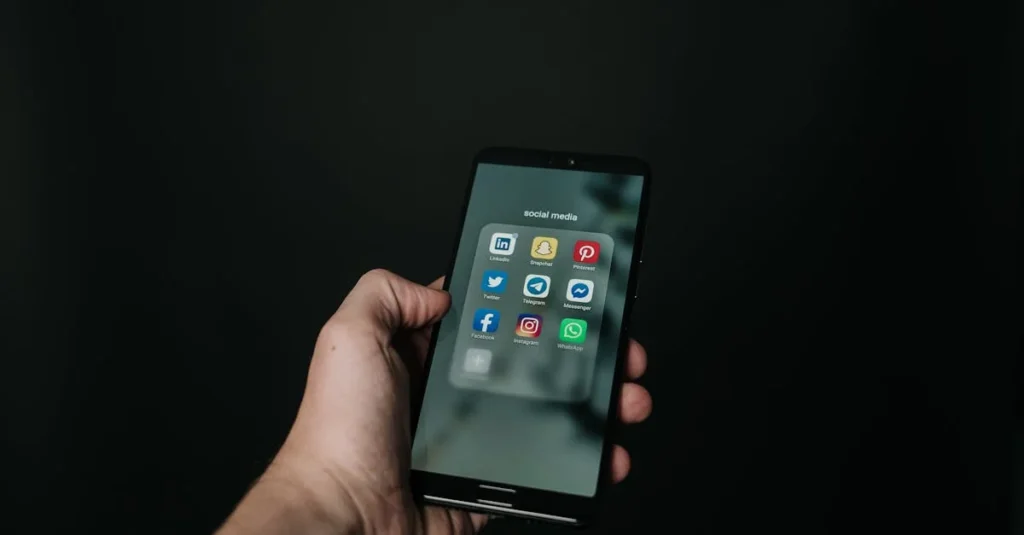Social media has transformed how college students connect communicate and share their campus experiences. With traditional platforms like Facebook and Instagram evolving many students now seek specialized apps designed specifically for their college community.
These college-focused social media apps create digital spaces where students can form study groups discover campus events and build meaningful connections with their peers. From anonymous confession boards to hyperlocal dating platforms these apps have revolutionized campus social life. They’ve become essential tools for navigating the modern college experience especially for freshmen looking to find their place in a new environment.
College Social Media Apps
College students leverage diverse social media platforms to connect with peers, share academic resources and participate in campus activities. Each platform serves distinct communication needs in the college environment.
Traditional Social Networks
Instagram dominates college social media with 95% of students using the platform for sharing campus moments through photos, Stories and Reels. Students utilize Facebook Groups to coordinate study sessions, buy/sell textbooks and discuss courses with classmates. Twitter enables students to follow university news, sports updates and campus announcements in real-time. LinkedIn helps students build professional networks through alumni connections and internship opportunities.
- Join interest-based groups aligned with majors and clubs
- Discover campus events and activities near their location
- Connect with classmates in shared courses and programs
- Access student discounts at local businesses
- Coordinate meetups for study sessions or social gatherings
| Platform | Primary Use | Student Usage Rate |
|---|---|---|
| Photo/Video Sharing | 95% | |
| GroupMe | Class Communication | 85% |
| YikYak | Anonymous Campus Chat | 60% |
| Canvas Student | Academic Discussion | 90% |
| Fizz/UNI | Campus Community | 40% |
Benefits of Using College Social Media Apps
College social media apps transform campus life by creating digital spaces for meaningful interactions among students, faculty, and staff. These platforms offer specific advantages that enhance both social and academic experiences.
Building Campus Connections
College social media apps facilitate instant connections between students sharing similar interests or academic paths. Students discover campus organizations through dedicated group features, join virtual meetups, and participate in discussions about shared hobbies. The apps’ location-based features help users find nearby study spots, campus events, and student gatherings. Digital bulletin boards within these apps showcase upcoming activities, club meetings, and social events, enabling students to expand their social circles beyond classroom interactions.
- File sharing capabilities for exchanging lecture notes, study guides, and research materials
- Discussion boards for course-specific topics and academic debates
- Project management tools for tracking group assignments and deadlines
- Virtual tutoring connections with peers in specific subjects
- Real-time notifications for class updates and assignment reminders
| Feature Usage Statistics | Percentage |
|---|---|
| Group Study Sessions | 78% |
| File Sharing | 85% |
| Academic Discussions | 72% |
| Project Coordination | 65% |
Safety and Privacy Considerations
College social media apps require robust security measures to protect student data and maintain digital wellbeing. Security protocols safeguard personal information while promoting healthy online engagement within campus communities.
Data Protection
College social media platforms implement multiple layers of data protection to secure student information:
- End-to-end encryption protects messages between users from unauthorized access
- Two-factor authentication adds an extra security layer to student accounts
- Privacy settings allow students to control who views their profile information
- Data storage complies with FERPA regulations for educational records
- Regular security audits identify potential vulnerabilities in the system
- Automated threat detection blocks suspicious login attempts
- Secure servers store sensitive information with industry-standard protocols
- Screen time tracking displays daily app usage statistics
- Focus mode blocks notifications during study sessions
- Content filters reduce exposure to harmful or inappropriate material
- Mindfulness reminders encourage breaks from continuous scrolling
- Time limits help students manage their online engagement
- Anonymous reporting systems address cyberbullying incidents
- Wellness resources connect students with mental health support
| Digital Wellbeing Statistics | Percentage |
|---|---|
| Students using screen time limits | 65% |
| Students enabling focus mode | 72% |
| Students utilizing content filters | 58% |
| Students accessing wellness resources | 45% |
Impact on College Experience
College social media apps significantly influence how students navigate their academic journey by reshaping social connections and engagement patterns.
Social Integration
Social media apps foster seamless integration into campus life through digital communities and real-time interactions. Students connect with peers sharing similar interests, backgrounds or academic pursuits through features like interest-based matching and group discovery. Statistics show:
| Integration Metric | Percentage |
|---|---|
| Students forming new friendships | 82% |
| International student connections | 75% |
| Cultural group participation | 68% |
| Cross-major interactions | 71% |
Student Engagement
College social media apps drive participation in campus activities through targeted event notifications and community features. Students receive personalized recommendations for:
- Joining academic clubs based on declared majors
- Attending departmental workshops through calendar integration
- Participating in campus traditions via location-based alerts
- Contributing to student organizations through built-in volunteering platforms
- Engaging in virtual study groups with course-specific chat rooms
| Activity Type | Student Participation Rate |
|---|---|
| Club membership | 78% |
| Campus events | 73% |
| Study groups | 85% |
| Volunteer activities | 62% |
| Academic discussions | 81% |
Best Practices for College Social Media Use
Setting Digital Boundaries
Digital boundaries protect students’ academic focus while maintaining social connections. Students create dedicated study times by muting notifications from 9 AM to 5 PM enabling concentrated learning periods. Effective boundary practices include designating specific social media check-in times selecting relevant notification settings organizing contact lists into academic professional groups.
Privacy Management
Privacy settings on college social media apps require regular updates to maintain data security. Students customize their visibility settings to share content with specific groups: classmates professors study partners. Critical privacy practices include:
- Reviewing friend connections each semester
- Enabling two-step verification on all accounts
- Using strong unique passwords for each platform
- Limiting location sharing to trusted contacts
- Checking app permissions monthly
Content Guidelines
Professional content creation enhances students’ digital presence across college platforms. Content best practices include:
- Posting academic achievements research projects internship experiences
- Sharing campus event highlights club activities volunteer work
- Creating educational content study tips course summaries
- Documenting collaborative projects group presentations workshops
- Highlighting leadership roles organizational involvement achievements
Time Management
Time tracking tools optimize social media engagement without compromising academic performance. Students implement these strategies:
- Using built-in app timers limiting platform access to 30 minutes daily
- Scheduling social media breaks between study sessions
- Activating focus mode during lectures assignments exams
- Utilizing productivity apps to track digital habits
- Setting automatic app lockouts during peak study hours
- Connecting with professors teaching assistants in relevant courses
- Joining academic department groups professional organizations
- Following industry leaders research centers in chosen fields
- Participating in virtual networking events career fairs
- Engaging with alumni networks mentorship programs
| Activity Type | Recommended Daily Time | Peak Usage Hours |
|---|---|---|
| Academic Networking | 20 minutes | 10 AM – 2 PM |
| Content Creation | 30 minutes | 3 PM – 6 PM |
| Study Groups | 45 minutes | 6 PM – 9 PM |
| Professional Development | 25 minutes | 11 AM – 1 PM |
| Campus Events | 15 minutes | 4 PM – 7 PM |
Campus Life Apps
College social media apps have revolutionized campus life by creating dynamic digital spaces where students can thrive both academically and socially. These platforms offer invaluable tools for collaboration study coordination and community building while prioritizing user privacy and digital wellbeing.
As technology continues to evolve these specialized apps will play an increasingly vital role in shaping the college experience. Students who embrace these platforms while maintaining healthy digital boundaries position themselves for success in their academic journey and beyond. The future of campus connectivity lies in the thoughtful integration of these digital tools with traditional college experiences.

